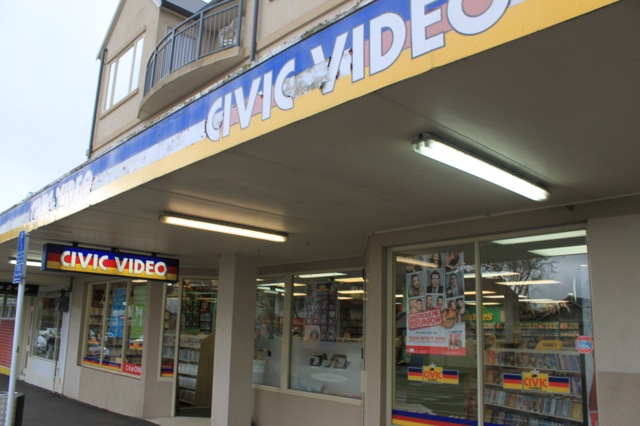Just the other day, I stopped by the video store and rented the beautifully haunting film, Whale Rider. What year exactly? Well, the movie came out in 2002. It’s now a classic. But as anachronistic as a stop by the video rental place may sound, it really is 2012. It’s just that I’m in New Zealand, where they are still putting in video stores in downtown shopping areas. Along with local butcher shops, village video rentals are still part of the Kiwi lifestyle. A little behind the rest of the world, but part of why I love living here.
You might call it an escape from a life of constant hyperventilation in the United States. Here, there’s breathing room, to slow down and connect. I used to always walk downtown connected to my cell phone, never missing a moment to multi-task. Here, I don’t dare disturb the peace by doing that. And unlike browsing a virtual video store, I savor picking up a worn plastic video case, checking out the awards and reviews and chatting to the usually well-versed clerk behind the counter before investing my money and time. Satisfying.
Slowing down. How many of you feel the way I did? My job in the States was fast-paced and at the end, largely unfulfilling. I anchored several evening newscasts in Sacramento, California, and filled the space between shows with freneticism: shooting promos, writing stories and blogs and manning our station’s social media sites constantly. It was the last post of a two-decade career in local TV news. Two decades which left the industry dramatically changed. Exhausted by the time I quit, I felt demoralized by the daily fight to try and stem the tide toward superficial infotainment. When the news business became beholden to ratings-driven profit, its role in democracy changed. As popular as The Newsroom is, it is not reality. As hard as it was to leave my toe-hold in the Fourth Estate, my role felt reduced to irrelevance by the time I stepped out of the spotlight. I am ready for reinvention.
Reconnecting. For our family, moving here promised a chance finally to be together. To sit down at the dinner table together again on a nightly basis. Not so simple as it sounds. I once did a story on a “happiness expert” hired by Californian families. Her most common curative was teaching them how to find time to talk together over a meal prepared and treated as if it were sacrosanct. But getting back to basics is, for many American families, an insurmountable challenge. Endless hours of extracurriculars, in the frenzied push to achieve by age 18, have transformed family kitchens into microwaved fast-food fueling stations. Nourishment at the deepest levels is declining dangerously.
Lifestyle change. Work / Life balance is a closely guarded concept in New Zealand. Social welfare programs came into existence as far back as the 1890s. Vacation time is plentiful and I regularly see people leaving work at 4 in the afternoon. Fathers collecting children from after school programs, then stopping by the grocery stores to pick up the evening meal. My own husband is walking to work after years of commuting three hours a day. He still manages to fill his workday to about 11 hours, so making it to the family dinner table isn’t always possible. His schedule grates against the norm, though the norm may have limits. A suggested plan to extend parental leave after the birth of a child from 14 to 26 weeks is likely not going to make it into legislation. Modern-day economic realities and the need to propel New Zealand forward in the global market are encroaching.
But it feels more like things here need recalibrating than overhauling. Back home, it felt like we were facing crises with no solutions. In California, the economic maelstrom of the credit crisis is bankrupting cities. The polarization and paralysis of the political system keeps leading to dead ends. Politically, it’s simpler in New Zealand. Last month, I was entertained by sharp-edged, quick-witted British-style Parliamentary debate during the open-to-the-public “Question Time.” The topic of the day was a plan announced by the government that would have increased class sizes. After only one week of backlash from schools and parents, the proposal was pulled. In California, the fight over education funding is eternal; constantly challenged by unions, and always targeted as low-hanging fruit by lawmakers desperate to find savings. Most government business here seems to get done without everything ending up in the court system.
It is, however, not Shangri-La. Even the movie Whale Rider highlighted deep-seated challenges within the Maori community in New Zealand. The government’s had to set up a special commission of inquiry, the Waitangi Tribunal, to settle some legal battles over the rights of the Maori, the first settlers here, in relation to the Pakeha (the name still used to describe European settlers.) But with a population of just about four and a half million, the problems at least seem more surmountable and the attitude more “can do” than what we left behind. It feels like a respite.
My family and I may not live forever in this land of video stores, where taking family walks is as popular a pastime as shopping is for Americans. We have made sacrifices, leaving behind loved ones and the many creature comforts and conveniences of American life. And it is a move not without its natural risks. This is the land of earthquakes and volcanoes, perched on the Ring of Fire itself. There are realities none of us can avoid and prices we all have to pay, eventually. For now, though, I’m grateful for a step back in time to find more time. Time to learn and explore, and even revisit old movies. With each viewing of Whale Rider, I understand more about my new home, its culture, its pain and beauty. A new prism through which to discover the nuances of my own life’s past and present reality.

